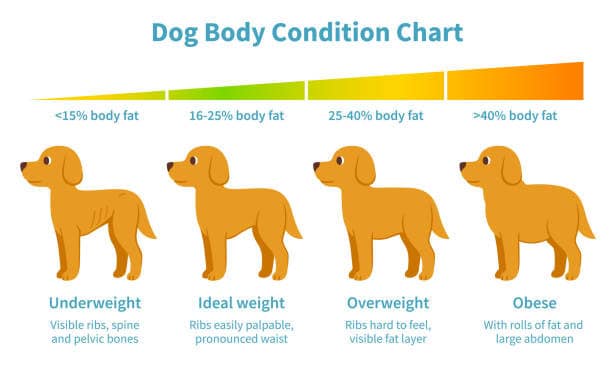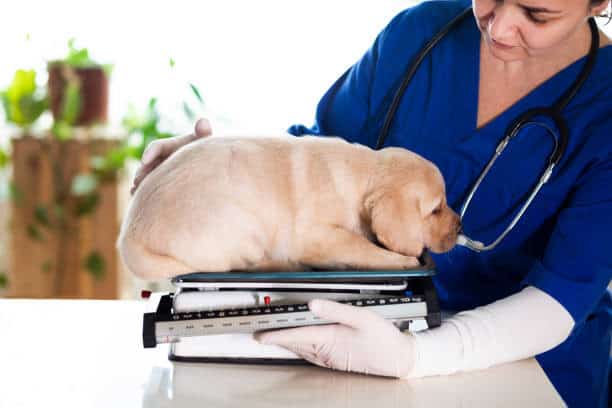The average weight for a Labrador Retriever depends on whether it is a male or female and is within the breed standard or oversized. According to the American Kennel Club, the breed standards for Labrador Retrievers are:

However, many Labs are prone to obesity and may weigh above the breed standards. Obese male Labs generally weigh 90 – 110 lbs (41 – 50 kg) and obese female Labs weigh 80 – 100 lbs (36 – 45 kg).
The Lab’s overall body condition and health is more important than a number on the scale. However knowing the average weights can help owners tell if their Lab is at a healthy weight for their size and structure.
how much do labs weigh?
Labrador weight varies according to age, gender, and activity level. Typically, a healthy adult Labrador weighs between 55-80 pounds. Here’s a general Labrador Retriever weight chart by age:
A Labrador’s weight gain is crucial to ensure proper growth and development as a puppy. A healthy Labrador puppy should gain around 2-3 pounds per week. By the time they are 6 months old, they should double their birth weight.
lab weight chart By Age
| Age | Weight Range |
| 8 weeks | 11-17 pounds |
| 3 months | 20-30 pounds |
| 6 months | 50-60 pounds |
| 1 year | 65-75 pounds |
| 2 years | 65-80 pounds |
Keeping track of your Labrador puppy’s weight is essential to ensure they are thriving. Labrador puppies possess a faster metabolism. They demand a greater amount of calories compared to adult canines. Therefore, feeding them proper puppy food is essential. Following are the guidelines to keep your Labrador puppy healthy and maintain its weight.
- Feed your puppy a high-quality diet specifically formulated for puppy growth.
- Avoid giving your puppy table scraps, as these can be high in fat and calories.
- Provide your puppy with regular puppy growth exercises and playtime to burn off excess calories.
- Consult with your veterinarian about your puppy’s nutrition and weight management.
English Lab Weight vs American Lab Weight
English Labs and American Labs have slight differences in appearance and weight. English Labs, initially bred as show dogs, tend to be stockier and heavier, while American Labs are taller and leaner.
As for weight, English Labs are heavier than other breeds, with an average weight of 70-80 lbs for males and 55-70 lbs for female labradors. On the other hand, American male labradors weigh between 55-80 lbs and 50-70 lbs for females.
how much do black labs weigh?
Black Labradors are one of the most popular Labrador colors, but their weight is no different than any other color. Like all Labradors, they are medium to large-sized dogs with a muscular build. These larger dogs weigh between 55-80 lbs, depending on their sex and whether they’re English or American Labrador.
how much do chocolate labs weigh?
Chocolate Labradors are a popular color variation of the same breed. They have a rich brown coat and are known for their sweet and loving temperament.
Like black Labs, chocolate Labs will also weigh between 55 and 80 lbs. However, it’s worth noting that chocolate Labrador Retrievers have a slightly higher risk of obesity than other colors. It is due to a genetic mutation that can cause them to feel hungry all the time, even if they’ve just eaten.

how much should a yellow lab weigh?
Yellow Labradors come in various shades, from pale cream to dark gold. They are known for their happy and outgoing personalities. They’ll weigh the same as black and chocolate Labs. Their ideal weight is between 55 and 80 lbs, depending on various factors.
How to properly maintain your Labrador’s Health: Golden Tips
Dog owners must care for the lab’s health and well-being to ensure a happy and long life. Discover ways to keep your Labrador healthy with these tips.
how to weigh a dog?
Keeping track of your dog’s weight is essential, especially if you notice any sudden weight loss or gain. To weigh your Labrador, follow these steps:
- Use a scale designed for weighing dogs or a bathroom scale.
- Get on the scale, note the weight, and then get on with your dog.
- To determine your dog’s weight, subtract your weight from the combined weight of you and your dog.
How to ensure your Labrador is healthy?
Apart from weighing your dog, there are other ways to ensure your Labrador is healthy:
- Feed a healthy diet: Ensure your dog gets a balanced diet of protein, carbs, fats, vitamins, and minerals. Adopt healthy feeding habits. Avoid table scraps and human food, leading to digestive problems and weight gain.
- Exercise: Regular exercise is essential for your dog’s physical and mental health. Take your Labrador for a walk or play fetch in the backyard.
- Regular vet visits: Take your dog to the vet for routine checkups and vaccinations. It will help detect any health issues early on.

Dangers of Growing Too Quickly or Stunted Growth
Labradors are a large breed. The puppy grows quite quickly. However, growing too quickly can lead to health issues such as hip dysplasia or joint problems. A stunted growth process can cause joint problems and developmental disorders. To prevent these issues:
- Monitor your dog’s weight and growth: Regularly weigh and measure them to ensure they thrive.
- Feed a balanced diet: Ensure your dog gets all the nutrients needed to support healthy growth.
- Prevent overfeeding: Overfeeding your dog may cause obesity, exerting excessive strain on its joints.
Effects of Neutering/Spaying on Growth
Neutering or spaying your Labrador can have an impact on its growth. Here’s what you need to know:
- Neutering/spaying can slow growth: The hormones that regulate the dog’s growth are affected by neutering or spaying, which can cause your dog to grow slower.
- Monitor weight and adjust diet: After neutering/spaying, monitor your dog’s weight and modify its diet to prevent obesity.
- Talk to your vet: Consult your vet about the right time to neuter/spay your dog and any potential impacts it may have on its growth.

How To Monitor Your Labrador’s Weight?
These medium to large dogs often suffer from obesity, which can cause numerous health problems such as joint pain, heart disease, and diabetes. Here’s what you need to know about monitoring your Labrador’s weight and keeping them healthy.
Weekly & Monthly Labrador Growth & Weight Chart (Male)
Labrador Retrievers are known for their athletic build and robustness. However, keeping a record of their weight from the time they are born to their adult phase is essential. A Male Labrador weighs 65-80 pounds as a full-grown Labrador Retriever, reaching their peak weight at around 18 months.
Male Labrador Retrievers are generally larger and heavier in weight than females. They are also more active and require exercise and a better balanced diet to maintain good health. Here is a rough idea of a male Labrador Retriever growth chart, weight-wise:
| Week | Weight Range | Height Range |
| 1 | 1.5-3 pounds | 3-4 inches |
| 2 | 3-5 pounds | 4-5 inches |
| 3 | 5-8 pounds | 5-6 inches |
| 4 | 8-11 pounds | 6-7 inches |
| 8 | 15-18 pounds | 9-10 inches |
| Month 4 | 35-45 pounds | 15-17 inches |
| Month 6 | 60-70 pounds | 19-21 inches |
| Month 9 | 65-70 pounds | 22-23 inches |
| 12 week old lab puppy weight | 65-75 pounds | 24-25 inches |
| Month 18 | 65-75 pounds | 24-25 inches |
| Month 24 | 65-80 pounds | 24-25 inches |
Weekly & Monthly Labrador Growth & Weight Chart (Female)
Female labs tend to be smaller and lighter in weight than males. However, they still have significant energy and require regular exercise and a balanced diet to maintain good health. The females weigh 55-70 pounds as a full-grown Labrador Retriever. Their peak weight is around 18 months. Here is a female Labrador Retriever weight and growth chart:
| 3 | 3-5 pounds | 5-6 inches |
| 4 | 5-7 pounds | 6-7 inches |
| 8 | 13-16 pounds | 9-10 inches |
| Month 4 | 25-35 pounds | 14-16 inches |
| Month 6 | 45-55 pounds | 18-20 inches |
| Month 9 | 45-60 pounds | 20-22 inches |
| Month 12 | 60-65 pounds | 21-23 inches |
| Month 18 | 60-70 pounds | 21-23 inches |
| Month 24 | 60-70 pounds | 21-23 inches |
This dog’s growth and weight chart is for reference purposes only. Every dog is different; some dog grow faster or slower than other dogs.
Here’s The best app to monitor your Labrador’s weight
Keeping track of your Labrador’s weight can be a hassle. That’s where technology comes in handy. With the help of the right app, you can easily keep track of your dog’s weight and monitor their health.
The best app to monitor your Labrador’s weight is the ‘MyPet’ app. It’s available for iOS and Android devices and is easy to use. The MyPet app allows you to keep a record of your dog’s weight, daily activities, and puppy food intake. You can also set reminders for vet appointments, medication, and grooming.
Labrador Growth Distinctions
As puppies, they are adorable and irresistible, but this medium-sized breed grows quickly. Their first year is crucial for the development of many dogs. Now I’ll talk about the unique dog’s growth patterns and what to anticipate during their initial year.
Physical Growth Distinctions:
Their growth rate varies depending on their gender, genetics, and diet. Here are the physical growth distinctions that you can expect in your Labrador’s first year:
How much should a 4-month-old lab weigh?
Your Labrador puppy will grow and gain weight quickly. They will double their birth weight within a week or two and may grow up to 10-15% of their adult weight by the end of the third month.
how much should a lab weigh at 6 months?
Your Labrador will continue to grow but at a slower pace. Their limbs will lengthen, and they will gain muscle mass. You may notice their coat changing color and texture.
how much does a 7 month old lab weigh?
By this time, your Labrador will have almost reached adulthood height. However, they may continue gaining weight and fill out their frame. They may also experience growth spurts during this time.
1-year-old labrador size
In their final months of growth, your Labrador will start to fill out and develop their adult body shape. The growth spurts will slow down, and their energy levels may increase.
Behavioral Growth Distinctions:
Besides physical growth, your Labrador’s first year is crucial for its behavioral development. Here are some behavioral growth distinctions that you can expect in your Labrador’s first year:
Socialization:
Early socialization is essential for Labradors to become well-adjusted and friendly dogs. Expose them to different people, places, and animals during their first few months to help them develop their social skills.
Teething:
Your Labrador will start losing their baby teeth at around four months. Provide them with chew toys and bones to help relieve their discomfort and prevent them from chewing on inappropriate objects.
Training:
Labradors are highly trainable due to their intelligence and receptive nature. Start training them early, like obedience training, to help them develop good behavior and manners.
Energy levels:
Labradors are energetic dogs that require plenty of exercise and playtime. However, their energy levels may fluctuate during their first year, so provide them with plenty of rest time.
Nutrition and Health:
Proper nutrition and health are crucial factors that affect your Labrador’s growth and development. Here are some important considerations for your Labrador’s first year:
Diet:
Provide your Labrador puppy with a balanced and nutritious diet appropriate for the dog’s age and size. To ascertain the proper quantity and quality of adult dog food for your Labrador, seek advice from your veterinarian.
Vaccinations:
Ensure your Labrador receives all the necessary vaccinations to protect them from common canine diseases.
Joint Health is Crucial:
Labradors are prone to joint problems, especially as this large dog ages. Their rapid growth during the first year can strain their joints, leading to hip dysplasia and arthritis. Maintaining your dog’s joint health with supplements like glucosamine and chondroitin supports joint health for your Labrador.
Health checkups:
Regular health checkups are essential for your Labrador’s overall health and well-being. Schedule appointments with your veterinarian to monitor their growth and development.
How To Measure Your Labrador’s Size?
Labrador Retrievers are a popular dog breed known for their loving personality and physical agility. However, when it comes to their size, many pet owners wonder how big their Labrador should be at different ages. Let us discuss the scope of Labrador Retrievers at different stages of their growth, from 8 weeks to 12 months.
how much should a 8 week old lab weigh?
At 8 weeks old, a Labrador Retriever puppy should weigh between 10 and 18 pounds. At this stage, puppies are still tiny and fragile, so handling them gently is essential. They are also still developing their coordination and learning to walk, run, and play.
how much should a 12 week old lab weigh?
By 12 weeks old, a Labrador Retriever puppy should weigh between 20 and 40 pounds. At this stage, they are becoming more confident in their movements and may start to explore their environment more. They are also teething, so it’s essential to provide them with appropriate chew toys to prevent them from chewing on furniture or other items in the house.
16 Week Old Lab Puppy Size
At 16 weeks old, a Labrador Retriever puppy should weigh between 35 and 45 pounds. They are becoming more active and energetic and exhibit hunting instincts, such as chasing after balls or other toys.
how much is a 6 month old lab puppy weight?
At 5-6 months old, a Labrador Retriever should weigh between 50 and 65 pounds if male and 40 and females weigh 55 pounds. They enter adolescence and may exhibit unwanted behaviors, such as jumping or chewing. Continuing their training and socialization is essential to help them develop into well-behaved adult dogs.
how much should a 9 month old lab weigh?
By 9 months old, a Labrador Retriever should weigh between 60 and 75 pounds if male and 45 and 65 pounds if female.
They are becoming more mature and may start to exhibit less of their adolescent behaviors. However, you must continue their training and provide plenty of exercises to keep them healthy and happy.
how much should a 1 year old lab weigh?
At 1 year old, a Labrador Retriever should weigh between 65 and 80 pounds if male and 50 and 70 pounds if female. They are now fully mature and should have reached their adult size.
Ideal Labrador Weight: Does Your Lab Pass The Test?
The correct weight for a Labrador depends on various factors such as age, gender, and activity level. Generally, a healthy Labrador should weigh between 55-80 pounds (25-36 kg). However, this can vary based on their circumstances. For instance, if your Labrador Retriever is a working dog, it may require more food and exercise, resulting in a higher weight.
what is the ideal weight for a labrador?
Maintaining an ideal weight is essential for Labradors as it can significantly impact their health and well-being. Obesity can lead to various health problems, such as joint pain, heart disease, diabetes, and respiratory issues.
Labradors tend to overeat and gain weight quickly, making monitoring their weight and maintaining a healthy diet and exercise routine essential. Being overweight can also shorten a Labrador’s lifespan and decrease its quality of life by affecting energy levels, mobility, and overall health.
Maintaining a healthy weight can help Labradors live a longer, healthier, and happier life and reduce the risk of health issues.
How to Check if Your Labrador is Overweight?
You can determine if your Labrador is overweight by:
Visual Inspection:
Stand above your dog and look down at its body. You should be able to see their waistline behind their ribs. Your dog may be overweight if you can’t see its waistline or if its ribs are not easily palpable.
Body Condition Score (BCS):
A BCS is a numerical scale that ranges from 1-9, with 1 being extremely underweight and 9 being significantly overweight. The BCS visualizes your dog’s body condition, muscle mass tone, and fat distribution.
It’s a reliable way to assess your Lab’s weight and determine if they are underweight dogs, overweight, or at an ideal weight. A healthy Labrador should score between 4-5. You can ask your veterinarian to perform a BCS on your dog and know how much their muscle weighs.
Weighing:
Regular weighing of your dog is essential to monitor their weight. To determine your dog’s weight, you can weigh them at home using a scale or visit the veterinarian for a weigh-in.

Tips for Your Labrador’s ideal weight
Portion Control
Controlling the food portions you give your Labrador is crucial in maintaining their healthy weight. Feeding them the right amount of food is essential based on their weight, age, and activity level. Overfeeding can contribute to obesity, leading to health issues.
Exercise
Exercise is another critical aspect of keeping your Labrador at a healthy weight. Regular exercise will help your dog maintain a healthy weight and keep them mentally stimulated, improving their mood. Exercise doesn’t have to be strenuous. Simple walks, playing fetch, and swimming can do wonders for your dog’s health.
Healthy Treats
Labradors love treats, but not all treats are created equal. Choosing healthy treats that are low in calories and provide nutritional benefits is essential. Avoid feeding your dog table scraps or high-calorie treats, as they can quickly add to their daily calorie intake.
Regular Vet Check-ups
Regular check-ups with your veterinarian are crucial for your Labrador’s overall health and well-being. During these visits, your veterinarian can assess your dog’s weight and advise you on maintaining a healthy weight. They can also detect any health issues early and provide the necessary treatment.
FAQs
Can a Labrador weigh 100 pounds?
Some Labradors can weigh 100 pounds or more, but it’s uncommon.
What is the average weight of a fully-grown Labrador?
The average Labrador weight of a fully-grown Labrador is between 55-80 pounds.
At what age is a Lab full-grown?
A Labrador is considered full-grown at around 12-18 months of age.
How do I know my Lab is overweight?
You can tell if your Labrador Retriever is overweight by feeling its ribs and waist and consulting a veterinarian.
What is the ideal weight for a black Lab?
The ideal weight for a black Labrador Retriever depends on size and gender but generally falls within the 55-80 pound range.
Can a Lab weigh 50 pounds?
Yes, Labradors can weigh 50 pounds, depending on their size and gender.
What is the average weight of a female Labrador in KG?
The average Lab weight of female dogs in kilograms is between 25-32 kg.
How much should a 1 year old Lab weigh?
A 1-year-old Labrador Retriever should weigh around 55-75 pounds, but it can vary based on gender and size.
What is the ideal weight for a 5 month Labrador puppy?
The ideal weight for a 5-month-old Labrador puppy is around 35-45 pounds.
How much should a 6 month old male lab weigh?
A 6-month-old male Labrador Retriever should weigh around 50-60 pounds.
At what age are lab puppies half their weight?
Labrador Retriever puppies are typically almost half their adult weight at around 14-16 weeks.
How often should a 4 month old lab eat?
A 4-month-old Lab should eat 3-4 meals daily, as a veterinarian recommends.
how much does a 10 week old lab weigh?
A 10-week-old Lab puppy should weigh 15-20 pounds, but this can vary depending on gender and size.
What should my 1 year old Lab weigh?
The ideal weight for a 1-year-old Lab depends on size and gender, but it should generally fall within the 55-80 pound range.
How long should I walk my 12 week old lab puppy?
A 12-week-old Lab puppy should be walked for short periods, around 10-15 minutes at a time, several times a day.
Why is my 6 month old lab so small?
There may be several reasons a 6-month-old Lab is smaller than average, including genetics, dog nutrition, or health issues.
How much should a 6 month old lab eat a day?
A 6-month-old Lab should eat 2-3 meals daily, as a veterinarian recommends.
What is a good weight for a lab puppy?
A good weight for a Lab puppy depends on size and gender, but it should steadily increase over time.
Is a 2 year old Lab still a puppy?
While Labradors are considered fully grown at 12-18 months, they can still exhibit puppy-like behavior until around 3 years old.
When do chocolate labs stop growing?
Chocolate Labradors stop growing between 12 and 18 months old. However, some dogs may continue growing until they are 2. The exact age at which a chocolate Lab stops growing will vary depending on the individual dog’s genetics and overall health.
How much do black labs weigh?
The average weight of a black Labrador Retriever is between 65 and 80 pounds. However, there is a range of healthy weights for black Labs, and some dogs may weigh as little as 55 pounds or as much as 90 pounds. The weight of a black Lab will also depend on its sex, with males being larger than females.
How Much Should A 3 Year Old Lab Weigh?
A 3-year-old Labrador Retriever should weigh between 65 and 80 pounds for a male and 55 and 70 pounds for a female.
How Much Should A 2 Year Old Lab Weigh?
A 2-year-old Labrador Retriever should weigh about the same as a 3-year-old Labrador Retriever. The average weight for a male is 65-80 pounds and for a female is 55-70 pounds.
How Much Should A 7 Month Old Lab Weigh?
A 7-month-old Labrador Retriever should weigh about half of its adult weight. The average weight for a male is 35-45 pounds and for a female is 30-40 pounds.
How Much Should A Female Chocolate Lab Weigh?
The average weight for a female chocolate Labrador Retriever is 55-70 pounds. s.
How Much Should A 9 Week Old Lab Weigh?
A 9-week-old Labrador Retriever should weigh about 15-20 pounds. The average weight for a male is 17 pounds and for a female is 16 pounds.
How Much Should A 12 Week Old Lab Puppy Weigh?
A 12-week-old Labrador Retriever should weigh about 20-25 pounds. The average weight for a male is 22 pounds and for a female is 21 pounds.
How Much Should A 5 Year Old Lab Weigh?
A 5-year-old Labrador Retriever should weigh about the same as a 3-year-old Labrador Retriever. The average weight for a male is 65-80 pounds and for a female is 55-70 pounds.
Why Is My Lab So Small?
There are a few reasons why your Labrador Retriever might be small. One possibility is that it is a small breed of Labrador Retriever. Another possibility is that it needs to get more exercise. Finally, your Labrador Retriever is simply a late bloomer and will still grow some more.
How Much Should A 4 Year Old Lab Weigh?
A 4-year-old Labrador Retriever should weigh about the same as a 3-year-old Labrador Retriever. The average weight for a male is 65-80 pounds and for a female is 55-70 pounds.
How Much Should A 15 Week Old Lab Weigh?
A 15-week-old Labrador Retriever should weigh about 25-30 pounds. The average weight for a male is 27 pounds and for a female is 26 pounds.
How Much Should A 7 Month Lab Weigh?
A 7-month-old Labrador Retriever should weigh about 35-45 pounds. The average weight for a male is 40 pounds and for a female is 37 pounds.
How Much Should A 3 Month Old Lab Weigh?
A 3-month-old Labrador Retriever should weigh about 12-15 pounds. The average weight for a male is 13 pounds and for a female is 12 pounds.
When Do Labrador Retrievers Stop Growing?
Labrador Retrievers typically stop growing between 12 and 18 months old. However, some dogs may continue to grow for up to 2 years old.
Author Profile
- Site Owner And Dog Lover
-
Aritra, the founder of Labradorandyou.com, is a lifelong dog lover whose passion ignited for Labradors for their loyalty and intelligence. With extensive research and personal experiences, Aritra has become a Labrador expert, offering a rich resource on the breed. Labradorandyou.com provides reliable, timely, and evidence-based information, including Labrador-specific product reviews, training techniques, and care tips.
Labradorandyou.com was born out of Aritra's passion and his desire to share his profound knowledge about the breed. The site serves as a comprehensive resource, offering a wealth of up-to-date information for Labrador owners and enthusiasts alike
Also by the author
-
 Lab-TypesNovember 17, 2023Old Dog Seizures: Causes, Symptoms, and Treatment Options
Lab-TypesNovember 17, 2023Old Dog Seizures: Causes, Symptoms, and Treatment Options
-
 Lab-TypesNovember 17, 2023Why Is My Dogs Poop Yellow? 8 Reasons & Solutions
Lab-TypesNovember 17, 2023Why Is My Dogs Poop Yellow? 8 Reasons & Solutions
-
 ReviewsNovember 17, 2023The Only Hill’s Science Diet Review You Need To Read
ReviewsNovember 17, 2023The Only Hill’s Science Diet Review You Need To Read
-
 Lab-TypesNovember 17, 2023How To Adopt An Emotional Support Dog?
Lab-TypesNovember 17, 2023How To Adopt An Emotional Support Dog?





